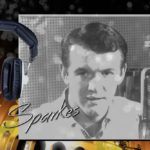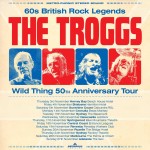What Makes Bob Weir A Unique Musician And Songwriter?
The Grateful Dead’s Bob Weir is widely recognised as one of the most prominent creative forces in the history of rock ‘n’ roll, best known for his roles as a rhythm guitarist, singer and songwriter.
But have you ever wondered what exactly sets him apart from other artists?
Weir isn’t just any American musician – he’s a rock music legend with a style all his own. Join us at Jukebox Saturday Night, as we look into what makes this rock icon so uniquely unforgettable.
Reason #1: Unique guitar-playing style
Pioneering a new approach to rhythm guitar
When it comes to rhythm guitar, Grateful Dead guitarist Bob Weir is often imitated, but few come close to his level.
Weir set himself apart by crafting a new rhythm guitar playing method akin to a jazz guitarist’s art of comping. But what’s interesting is how he developed his guitar techniques in the first place.
In an interview, Weir said his guitar style was mainly derived from listening to piano players, primarily McCoy Tyner, the pianist for John Coltrane. According to him, there weren’t any real examples of other good rhythm guitarists for him to emulate, so he had to take inspiration from pianists instead.
The Bob Weir guitar style was deeply influenced by how well Tyner set the stage for Coltrane’s improvisations, and he aimed to achieve the same results with his rhythm guitar style. And, indeed, the distinctive improvisational band dynamics between Jerry Garcia and Phil Lesh allowed him to do this perfectly.
Like Little River Band members, Weir exhibited exceptional adaptability. He interweaved chords and brief melodic phrases into the intricate dialogue taking place between Garcia and Lesh. His ability to elevate the harmonic structure of any song quickly became apparent and is one of the many reasons he is held in such high regard today.
Impact on the Grateful Dead’s signature sound
There is no doubt that Weir’s way of going beyond traditional backup guitar methods became the heart and soul of the Grateful Dead’s music.
Weir’s rhythm guitar playing was instrumental (pun intended) in defining the Grateful Dead’s unmistakable sound. His skill facilitated a unique synergy that flawlessly merged with the bustling lead lines woven by Garcia and Lesh, ultimately creating multi-layered, complex melodies that became the Grateful Dead’s definitive style, unlike forgotten 70s bands.
Reason #2: Distinctive songwriting and vocals
Contributions to the Grateful Dead’s catalogue
Bob Weir was more than just a guitar player for The Grateful Dead – he was also a composer and songwriter, padding the band’s extensive music library. Alongside his bandmates, Weir was key in the making of some of the band’s anthems, such as ‘Mexicali blues’, ‘Sugar magnolia’, ‘Playing in the band’, and ‘That’s it for the other one’ – either by co-writing the lyrics or composing the song.
Diverse range of songs with lead vocals
Jerry Garcia was typically at the forefront as the Grateful Dead’s main vocalist. Despite this, the band had its fair share of Bob Weir songs where he would be the lead. From the upbeat ‘Sugar magnolia’ to the laid-back ‘Estimated prophet’, Weir’s leading vocals were essential for certain songs.
Some may think that Garcia outshined Weir in certain aspects. However, it cannot be denied that Weir’s distinctive raspy baritone voice added a fresh tone to the group’s rock and country-influenced music.
Frequently Asked Questions (FAQ)
What bands has Bob Weir been a part of?
Bob Weir has nurtured his talent in numerous bands over the years, playing a key role in shaping beloved music that’s still being listened to around the web. Apart from the Grateful Dead, his iconic career path includes:
- Kingfish: Kingfish was a side project parallel to Weir’s commitment to the Grateful Dead.
- Bobby and the Midnites: This was Weir’s main side project during the early 1980s.
- RatDog: Formed in 1995, RatDog became Weir’s primary band when the Grateful Dead disbanded after Jerry Garcia’s demise and departure for R’n’R Heaven.
- Furthur: Reuniting with former Grateful Dead bassist Phil Lesh, Weir co-led Furthur, creating memorable rhythms for their dedicated fanbase.
- Dead & Company: In 2015, Weir joined forces with esteemed performers to form Dead & Company, thrilling countless fans and keeping the Grateful Dead legacy alive.
How did Bob Weir meet Jerry Garcia?
Bob Weir and Jerry Garcia met on New Year’s Eve, 1963. Weir was merely 16 years old, seeking the warmth of a jam session with a friend, when he discovered a 21-year-old Garcia in a Palo Alto music store.
Garcia invited Weir to play some music with him, and they ended up doing so for hours on end. This unexpected meeting led to the birth of Mother McCree’s Uptown Jug Champions, a band that later blossomed into the beloved Grateful Dead.
Did Bob Weir ever have a solo career apart from the Grateful Dead?
Yes. The Bob Weir solo career proved to be decent, with his first solo album Ace debuting in 1972. Weir then went on to release two more solo albums: Heaven help the fool (1978) and Blue mountain (2016) in addition to the 2004 compilation album, Weir Here – The Best of Bob Weir.
Celebrate legends at Jukebox Saturday Night
Welcome to Jukebox Saturday Night, where we talk about everything from Weir and the Grateful Dead to authentic Beatles memorabilia. Our passion, fueled by a profound love for music, was first sparked into existence by two mates.
With time, our small but ear-splittingly loud vision of fan-driven music celebration has gone from strength to strength, gaining an incredibly loyal base of music fans eager to know all about icons from different genres, from mainstream rock icons to country stars and so much more.
Our roots can be traced back to Ken Sparkes, a consummate innovator and the ultimate fanatic who devoted his time, money, and energy to champion and honour the true spirit of music.
Ken’s infectious love for the rock scene led him to transform what was once a tiny radio show into JBSN’s gem of a platform. And, despite his untimely passing in September 2016, his legacy continues to reverberate through the radio and TV airwaves, carried forward by his son and nephew.
At Jukebox Saturday Night, our vision is to amplify and proudly honour the roots and reach of rock, pop and country music. Our show and website are very laid-back, and we cover a wide range of interesting topics, including in-depth discussions on what happened to Leif Garrett and more.
Whether you’re a lifelong fan or a complete newbie, our platform is your gateway to the heart and soul of music history. Together, let’s keep the spirit of music alive and continue rocking for generations to come.



